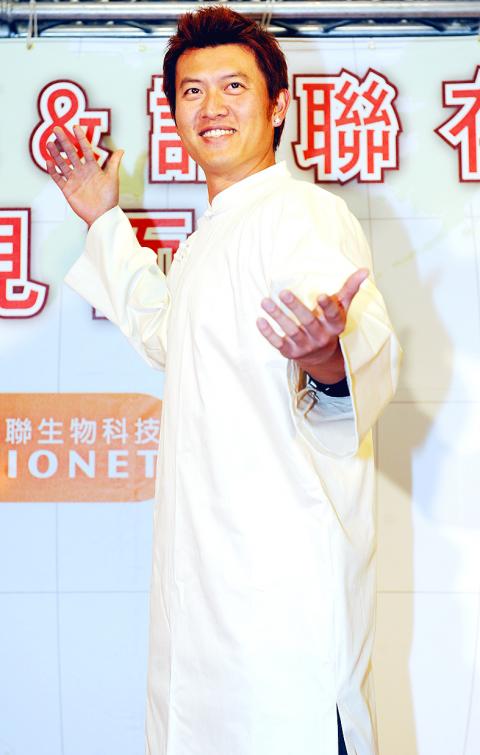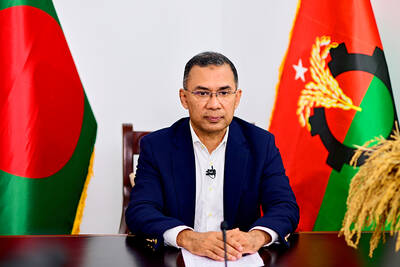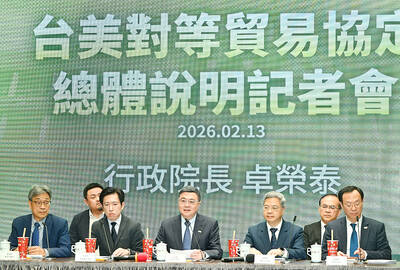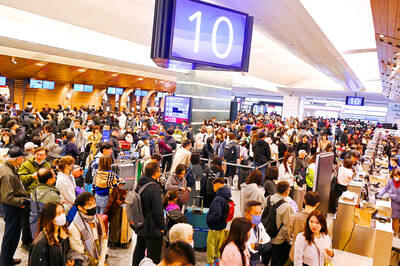Taiwanese right-hander Wang Chien-ming (王建民) has signed a one-year contract to rejoin the Washington Nationals that will guarantee him a base salary of US$1 million and give him a chance to earn another US$4 million in incentives, Wang’s US-based agent Alan Chang said in a statement early yesterday.
“Wang has expressed gratitude to the Nationals for its recognition and confidence in his ability. He is currently working on individual training in Taiwan and is scheduled to be back in the US early next year,” Chang said in the press release.
Wang, who played for the New York Yankees before being released late last year, signed with the Nationals in February for a year with a guaranteed US$2 million salary.

PHOTO: CHANG CHIA-MING, TAIPEI TIMES
However, he has been in rehabilitation for the past 15 months and has not pitched for the Nationals in a Major League Baseball (MLB) game, only appearing in two instructional league games in October.
Wang was not offered a contract by the Nationals before the deadline of Dec. 3 and therefore became a free agent.
According to an MLB report published early yesterday, Wang had indicated to his agent that he wanted to stay with the Nationals because of the way they treated him while he was recovering from surgery to his right shoulder.
Although Wang will receive only half the guaranteed salary of his previous contract, he can secure up to US$4 million in incentives next season.
Wang will be paid US$250,000 if he stays on the 25-man roster for more than 30 days, a further US$250,000 if he stays for 30 more days, and an additional US$250,000 if he stays for another 30 days after that, according to the contract.
The incentives will be based on how many games Wang appears in as a starting pitcher.
He will earn an extra US$100,000 for between 10 and 19 games, US$150,000 for between 20 and 21 games, US$200,000 for his 22nd starting job and US$300,000 for between 23 and 27 games.
Wang will receive as much as US$600,000 if he wins any MLB award, including US$200,000 for the Comeback Player of the Year award.
Wang won more games than any other big league pitcher (38) between 2006 and 2007, but his injuries have limited him to just 27 appearances over the past two years.
In his last year with the Yankees, Wang was 1-6 with an atrocious 9.64 ERA before being shut down for the season because of his shoulder.
Commenting on the new contract, Wang said: “I am very happy because I had no team last year.”
“The Nationals are signing me and bringing me back to major league baseball, and they are letting me recover without putting any pressure on me, so I can let my arm heal completely before I get back out on the pitch,” the Taiwanese pitcher said.
Wang also said that he should be able to return in April or May next year, and that he currently is doing weight training and rehabilitation six to eight hours a day.
Wang also said he has started pitching again.
He said that both his speed and his different types of pitches are looking good.

PEACE AT LAST? UN experts had warned of threats and attacks ahead of the voting, but after a turbulent period, Bangladesh has seemingly reacted to the result with calm The Bangladesh Nationalist Party (BNP) yesterday celebrated a landslide victory in the first elections held since a deadly 2024 uprising, with party leader Tarique Rahman to become prime minister. Bangladesh Election Commission figures showed that the BNP alliance had won 212 seats, compared with 77 for the Islamist-led Jamaat-e-Islami alliance. The US embassy congratulated Rahman and the BNP for a “historic victory,” while India praised Rahman’s “decisive win” in a significant step after recent rocky relations with Bangladesh. China and Pakistan, which grew closer to Bangladesh since the uprising and the souring of ties with India, where ousted Bangladeshi prime minister Sheikh Hasina

FAST-TRACK: The deal is to be sent to the legislature, but time is of the essence, as Trump had raised tariffs on Seoul when it failed to quickly ratify a similar pact Taiwan and the US on Thursday signed a trade agreement that caps US tariffs on Taiwanese goods at 15 percent and provides preferential market access for US industrial and agricultural exports, including cars, and beef and pork products. The Taiwan-US Agreement on Reciprocal Trade confirms a 15 percent US tariff for Taiwanese goods, and grants Taiwanese semiconductors and related products the most-favorable-treatment under Section 232 of the Trade Expansion Act, the Executive Yuan said. In addition, 2,072 items — representing nearly 20 percent of Taiwan’s total exports to the US — would be exempt from additional tariffs and be subject only to

NON-NEGOTIABLE: The US president’s action ran counter to one of the US’ ‘six assurances’ on not consulting China about arms sales to Taiwan, US lawmakers said US President Donald Trump’s admission that he is discussing arms sales to Taiwan with Chinese President Xi Jinping (習近平) is “alarming and a blatant violation of US policy and the six assurances,” US Representative Ro Khanna said on Tuesday. Trump on Monday said he would decide soon on whether to send more weapons to Taiwan, after Xi warned him not to do so. “I’m talking to him about it. We had a good conversation, and we’ll make a determination pretty soon,” Trump told reporters aboard Air Force One when asked about warnings raised by Beijing during a phone call with Xi over

HOLIDAY RUSH: Airport passenger volume is expected to reach a new high, while southbound road traffic would likely peak from Tuesday As Lunar New Year travelers flock overseas, passenger traffic at Taiwan Taoyuan International Airport is expected to shatter records, as Taoyuan International Airport Corp (TIAC, 桃園國際機場), Taiwan’s largest aviation hub operator, projected yesterday’s passenger volume to climb to 167,000. The figure comes after a record single-day high of 161,000 passengers on Thursday, and would surpass the previous pre-COVID-19 pandemic Lunar New Year peak of 166,000 passengers in 2019, TIAC said. Long lines could be seen forming as early as 7am yesterday, filling Terminal 1 of the airport almost to capacity, yet security checks took only 10 to 15 minutes. TIAC urged